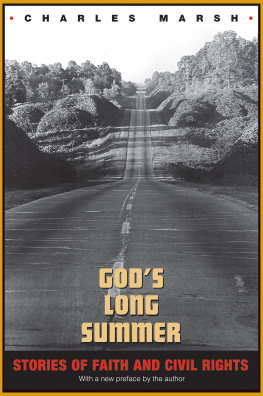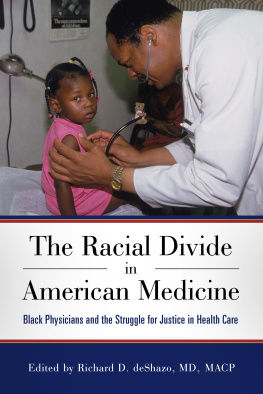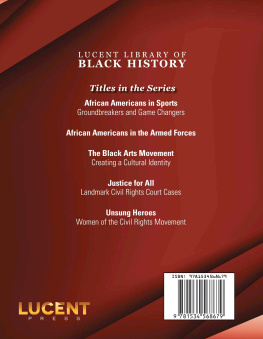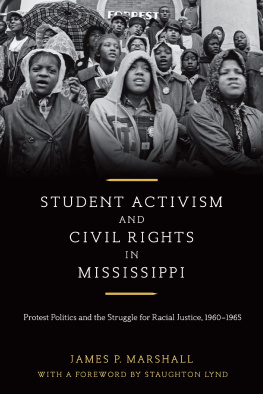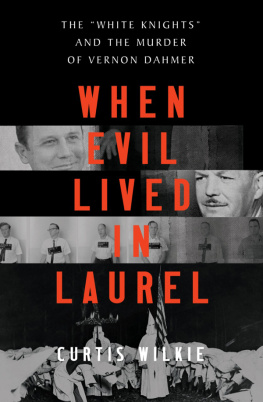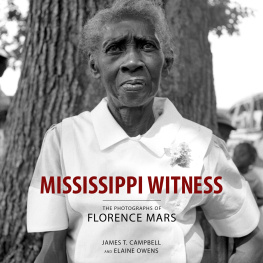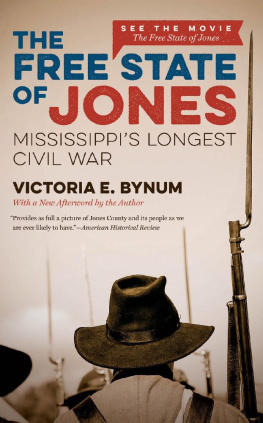www.upress.state.ms.us
The University Press of Mississippi is a member of the Association of American University Presses.
Copyright 2015 by University Press of Mississippi
All rights reserved
Manufactured in the United States of America
First printing 2015
Library of Congress Cataloging-in-Publication Data
Boyett, Patricia Michelle, author.
Right to revolt : the crusade for racial justice in Mississippis Central Piney Woods / Patricia Michelle Boyett.
pages cm
Includes bibliographical references and index.
ISBN 978-1-4968-0430-3 (cloth : alk. paper) ISBN 978-1-4968-0431-0 (ebook) 1. African AmericansCivil rightsMississippiPiney Woods (Region)History20th century. 2. Civil rights movementsMississippiPiney Woods (Region)History20th century. 3. Race discriminationMississippiPiney Woods (Region)History20th century. 4. African AmericansMississippiPiney Woods (Region)History20th century. 5. Piney Woods (Miss. : Region)Race relations. I. Title.
F347.P63B69 2015
323.119607307625dc23
2015019357
British Library Cataloging-in-Publication Data available
TO MY PARENTS, BONNIE AND BOB BUZARD, FOR GIVING ME WINGS, AND to my husband, Ricky Boyett, for traveling with me on this journey as I sought to trace a courageous struggle of men, women, and children who revolted against injustice. This book is dedicated to them too, to those named in these pages, and to the far too many unnamed freedom fighters.
Acknowledgments
A BOOK IS A PILGRIMAGE IN SEARCH OF SOME TRUTH, AND MINE TOOK me deep into a southern landscape filled with an array of intriguing people whose stories captivated me. It led me into libraries, courthouses, and government buildings that held scattered pieces of racial struggles tucked neatly away in boxes by dedicated archivists and civil servants, and it brought me into university offices filled with devoted professors who became my guides across unknown terrains as I sought to reconnect the fragments of the past into the mosaic they once made. I have not enough space here to name each person who helped me in my endeavors, but I am deeply grateful to all of them.
I wish to thank first the men and women who opened their homes and offices to me and shared their experiences in Mississippis racial struggles. They continue to move and inspire me. I would never have had this opportunity to convey their stories were it not for the assistance of so many people and institutions. Thus, I wish to express my deep gratitude to the University Press of Mississippi, particularly Craig Gill, for believing in my manuscript and for guiding me through the process of transforming it into a book. Thanks also to an amazing group at the press, including Anne Stascavage, Katie Keene, John Langston, Courtney McCreary, Steven B. Yates, Kathy Burgess, Clint Kimberling, and Kristin Kilpatrick. I am also grateful to the readers of my manuscript, Jason Morgan Ward at Mississippi State University and Charles L. Hughes at Oklahoma State University, for their insightful critiques and their wise counsel. Thank you also to Michael Levine for his meticulous and graceful copyediting. I am deeply appreciative to the University of Southern Mississippi for providing me with the Washam Dissertation Award and the William D. McCain Fellowship, which helped me develop the first wave of research. I am a grateful recipient of the RAND Gulf States Policy Institute Scholars Award (2007) and the Mississippi Historical Societys Franklin L. Riley Prize (2012), which helped me with the middle and latter stages of my work. A special thanks goes to Rachel Swanger at RAND and to Charles Bolton, James Pat Smith, and Jane Elliott Crawford of the Mississippi Historical Societys prize committee for considering my research worthy of support. Thank you also to Rosemary James and Joe J. DeSalvo of Pirates Alley Faulkner Society in New Orleans for their faith in my manuscript.
I was blessed to encounter so many wonderful educators on my circuitous journey toward becoming a historian. At University City High School, Susan Vreeland cultivated in me a love for the art of writing; at Arizona State University, theater professors David Vining and David Barker guided me toward a deeper understanding of the human experience; at Mississippi Valley State University, Larry Chappell, Ellen Singh, Robert Waters, the Thomases, and all of my professors and fellow students opened a world of knowledge to me about racial struggles in America. While at the University of Southern Mississippi, Bradley G. Bond allowed me freedom of exploration in my research and writing, which he tempered by coloring multiple drafts with red ink and by teaching me with great wit and wisdom how to sculpt raw ideas into narratives. Neil R. McMillen opened his home and his brilliant mind to me long after he retired. Curtis Austin, Louis Kyriakoudes, Andrew Wiest, William Scarborough, and Marjorie Spruill all read various drafts and offered thorough critiques. My peers also encouraged me with thoughtful evaluations at our beloved Hattiesburg joints.
Many scholars, archivists, and librarians provided me exceptional assistance. Yvonne Arnold, Jennifer Brannock, Diane Ross, Danielle Bishop, and Peggy Price went out of their way to help me sift through new unprocessed collections at McCain Library and Archives. Curtis Austin, Louis Kyriakoudes, Linda VanZandt, Stephen Sloan, Charles Bolton, and Stephanie Scull-DeArmey helped me mine through a treasure trove of oral histories housed at the Center for Oral History and Cultural Heritage at the University of Southern Mississippi, and they provided me with equipment, contacts, and wise instruction when I conducted my own interviews. Christa Cleeton at the Seeley G. Mudd Manuscript Library and Joyce Dixon-Lawson and William L. Thompson at the Mississippi Department of Archives and History went above the call of duty to locate vital sources for me. Many city, county, and state employees graciously aided me in my research, especially Gwen Wilks and Debbie Benardo. Thank you also to Danielle McGuire, Michele Coffey, Crystal Feimster, Marjorie Spruill, and Ted Owenby for their advice during conference sessions. I am grateful to all of my colleagues at Loyola University New Orleans for their guidance and fellowship as I worked toward the publication of my manuscript. And I am moved by a constant source of inspiration: the many magnificent students whom I have had the privilege of working with in my career; their curiosity and passion drive me to continue seeking new understandings of the past and of the struggles of our own era.
My family and friends have been a constant source of unwavering support. Becky and Donnie Boyett, the Highlanders, the Kiehls, the Brians, the Riccis, the Temples, my most cherished lifetime friends from San Diego, particularly Annette Scuderi, Kim Beck, Whitney Punches, Diane Sheehan, Kari Kruesi, and Julia Walsh, my college friends, and the mothers club extended fellowship and encouragement. My parents have been a wellspring of love and influence. My mom, Bonnie Buzard, inculcated in me a reverence for human struggles by coloring my childhood with literature and theater; my dad, Robert Buzard, taught me to seek truth and justice by his outstanding example. My sisters, Cindy Kiehl and Jenny Highlander, both exemplary educators, listened patiently to my research findings and ideas and supported me like best friends do. Thanks to T. L. Boyett who gave me joy when I needed it most. I wish also to thank my grandmother, Teresa Temple, because she believed in dreams and never doubted mine. I am eternally grateful to my husband, Ricky Boyett, whom I fell in love with at the University of Southern Mississippi and who became my fellow traveler; he listened to every thesis and narrative development of my work, repaired my technical disasters, made me laugh in my darkest hours, and endured with uncommon patience the long hours and the long years I devoted to this book. He is my sanctuary, my compatriot, my North Star.


